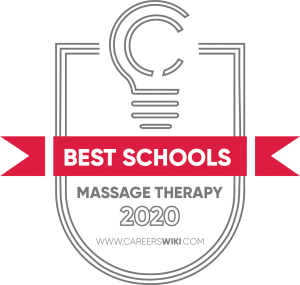…
There are about 10 massage therapy schools in Massachusetts. Among them are private institutes and beauty schools, as well as public colleges.
Programs are composed of classroom lectures, hands-on lab sessions, and real-world clinical experience. Graduates receive certificates or diplomas after less than one year of study.
Massage therapists in the Bay State enjoy high incomes, compared with the national median. The number of jobs continues to climb, with a projected 470 annual openings until 2026.
You might also be interested in viewing our full list of massage schools.

An office within the Massachusetts Division of Professional Licensure, this panel licenses MT practitioners, schools, and establishments.
The board develops minimum standards for school programs and instructors, requires license applicants to pass an examination, ensures that licensees renew their credentials, and establishes continuing education rules.
There are seven board members, appointed by the governor. Three are licensed massage therapists who have practiced in the state for at least five years. One is an elected public health professional, one is a school operator, and two are consumers familiar with the field.
Massage therapy schools limit enrollment to applicants who hold high school diplomas or GEDs. Some recommend taking extra health and science classes while in high school.
Selecting an appropriate postsecondary institution is critical. The state licenses only graduates of accredited schools with programs that meet the board’s requirements. There must be 650 or more contact hours, including 550 hours of academic courses and 100 hours of clinical experience.
A curriculum is to contain 100 hours in anatomy and physiology; 45 hours in pathology; 45 hours in kinesiology; 60 hours in ethics, professionalism, and business practices; and 300 hours of supervised classroom massage theory and technique.
Certificates and degrees qualify prospective practitioners to apply to the board for licenses. They need to pass the Massage and Bodywork Licensing Exam (MBLEx) or the National Certification Examination for Therapeutic Massage and Bodywork (MCBTMB).
Therapists have to obtain license renewals and attend continuing education classes every three years.
We selected the schools below based on the programs that they offer, accreditation, student population, graduation rate and reputation.
View our Ranking Methodology to learn more about how we rank schools.

N/A
45
This independent institution in Worcester, founded in 1950, offers a 720-contact-hour diploma program that students take full time during the day or part time in the evenings.
The curriculum combines Western health models with Eastern approaches. In addition to the courses the state requires, classes include Asian Massage Techniques, Health, Regional Massage, Sports and Repetitive Use Injuries, Seated/Onsite Massage, and Spa Techniques.
There is a practicum and an internship. A student clinic serves the general public with one-hour Swedish, regional deep tissue, and relaxation massages. Bancroft provides job-placement assistance and continuing education classes.
86%
55
This private school has three massage therapy programs in Ipswich and Plymouth that take between six and 14 months to complete. There are full-time, part-time, and evening class schedules.
The therapeutic massage program consists of 650 contact hours. It teaches Swedish massage, trigger point therapy, deep tissue massage, positional release, foot pressure point techniques, range of motion, chair massage, stretching techniques, myofascial release, event sports massage, hydrotherapy, and professional development and empowerment.
The 770-hour holistic massage curriculum provides “a more extensive skill set.” Students take the other program’s courses, plus classes in polarity therapy and the RYSE energy modality.
36%
210
A for-profit institute dating to 1917, Mildred Elley offers an 833.5-contact-hour certificate program that lasts less than one year. Day and evening class schedules begin every eight weeks.
Two Western Massage Techniques courses teach Swedish massage, myofascial release, trigger point therapy, hydrotherapy, essential oils, seated massage, client communication and assessment, and self care. Students also take Body Mechanics, Sports Massage, and Integrative Massage Techniques.
The curriculum features four rotations of administering Swedish, prenatal, hot stone, myofascial, craniosacral, and deep tissue treatments in a student clinic. The school has career services and lifetime job-placement assistance.
89%
221
This private institution’s campus in Medford provides four MT diploma options. A 650-contact-hour program is available full time during the day, and part time in the evenings and on Saturdays. A 750-hour alternative is during the day, either full time or three-quarter time.
There is instruction in Swedish, deep tissue, sports, and prenatal massage. Other classes concern myofascial release, trigger point therapy, energetic practices, spa therapies and body wraps, and personal growth and awareness.
Students treat the public at events like the Boston Marathon. The school has continuing education in Spa Therapy, Essential Oil Therapy, Reiki, and Sacred Stone Massage.
19%
1696
Located just outside Pittsfield, BCC is the oldest public community college in the state. It primarily serves students from Berkshire County.
The school’s 29-credit-hour massage therapy certificate program entails one year of courses and clinics. Classes are held part time in the evenings, beginning in the spring every other year. In addition to state-mandated courses, students take Introduction to Complementary Care and Integrative Health, Fundamentals of Human Disease, and two Therapeutic Massage classes.
The curriculum concludes with a 100-hour clinical practicum. The school accepts program applicants on a space-available basis.
$23.7
$49,200
19%
For the typical massage therapist in this state, the pay is either about $49,200 per year or $23.70 an hour. That exceeds the U.S. median of around $41,400 or $20.
The leading 10% of Massachusetts practitioners receive nearly $89,000 or $42.80, better than approximately $78,300 or $37.60 nationwide. Income among the bottom 10% is about $29,230 or $14 in the state; around $21,350 or $10.25 nationally.
Positions for massage therapists here in 2016 numbered 3,650. There will be 4,330 jobs in 2026, say federal labor officials — a 19 percent rate of growth, slower than the expected U.S. median of 26 percent.
Sources: U.S. Bureau of Labor Statistics, CareerOneStop

LIMITED TIME DEAL